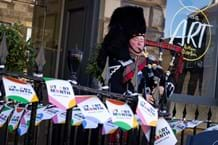LAPADA, the Association of Art and Antique Dealers, conducted the survey in advance of their annual conference in London on February 28, when a panel of specialists will address the problems raised in the survey. Dealer delegates will make their own contributions to the debate on the best ways to get more out of the banks during a recession.
Key findings in the survey include the following:
• 45% of respondents felt that their bank did not understand the nature of the antiques business well at all. A quarter felt that their bank had only a slight understanding, though a further quarter did think that they understood the business moderately well. Only six per cent said their bank had a very good understanding.
• Just under a third of respondents said that they had been subjected to unreasonable demands for a loan or overdraft, with only 23% saying they understood how the bank assessed the value of their stock when establishing credit or finance ratings. Some dealers said banks accepted their own valuations of their stock, but many others commented that the banks did not take stock value seriously as an asset. As many as 58% said they thought that their assets had been undervalued.
• Perhaps surprisingly, dealers were fairly evenly split when it came to evaluating their relationship with their bank manager. Overall nearly 48% were satisfied, while just over 46% were dissatisfied. Only 7% said they were very satisfied, but a significant 25% admitted that they were very dissatisfied.
• The majority of dealers thought banking services had deteriorated over the past ten years. Nearly 67% said business support was worse and over 60% said that personal services were worse.
Perhaps the most revealing section of the survey asked dealers to suggest improvements to the service they received. Dealers considered that young (and constantly changing) teams of 'relationship managers' were no substitute for old-style bank managers with the experience to assess clients and make decisions. At worst, 'relationship managers' seemed incapable of deviating from a set script designed to sell further services.
A number regretted that current banking practice seemed not to take notice of past business performance.
As one dealer remarked: "All I would really ask is: a) an acknowledgement that if I have kept myself for 25 years, it might indicate that I have a rough idea of what I am doing, and b) … that I have never yet promised anything and not delivered. I have never gone broke (which is once less often than my bank)."
There were many calls for banks to take the time to understand the nature of the art and antiques business, but there were also acknowledgements that dealers were not the only small businesses having trouble communicating with their banks. Many self-employed and small high street businesses face the same problem of being categorised as high risk, it was felt.
One dealer wanted to know how antique dealers could present themselves and their business in a way that banks can understand: "Don't forget the average bank manager finds it difficult to grasp the notion that most of our stock is paid for before re-sale; hardly Tesco is it! Add to that the fact that a lot of stock is bought in anticipation of a sale, not for a definite sale, and the problem for bankers compounds itself.
"There are, however, positives, which banks would love to hear. A lot of stock is cheaper to buy than at any time since the early 1970s and interest rates are incredibly low, therefore enabling the astute dealer to buy a lot more for less," they reasoned.
This is the approach that the LAPADA conference will take. The association's chairman Lord Chadlington will chair a panel of bankers, business advisers and financiers to explore the way that banks view the trade and how best to present a good case to them. They will also advise on what to do when things go wrong and explore other ways of financing a business.
Following feedback from last year's event, this year's conference will allow more time for contributions from the delegates themselves, and a second panel discussion, chaired by Mark Henderson, director of Walpole, the British Luxury Trade Association, will explore the place of art and antiques in the luxury marketplace.
After lunch, Lord Chadlington will chair an open forum debate, inviting participants to draw upon the skills of ATG editor Ivan Macquisten on the power of PR, silver dealer Daniel Bexfield on successful viral marketing campaigns, Ron Archibald, director of the Trade Access Programme at UKTI, on trading with emerging markets, Carmine Bruno, MD of Online Galleries, on selling antiques online, and LAPADA chief executive Sarah Percy-Davis on current trade issues.
LAPADA have made ten places at the conference available to non-members who want to join in the various debates. However, those interested are advised to book early as any LAPADA members who have not already booked will also be able to take them up.
The conference is held in association with Antiques Trade Gazette, Cadogan Tate and Besso Limited and will be held at Goldsmiths' Hall in the City of London. With participation limited to 80 delegates and a cost of only £55 +VAT for the day, including a three-course lunch, demand is expected to be high. Applications should be made as soon as possible to LAPADA on 020 7823 3511.




